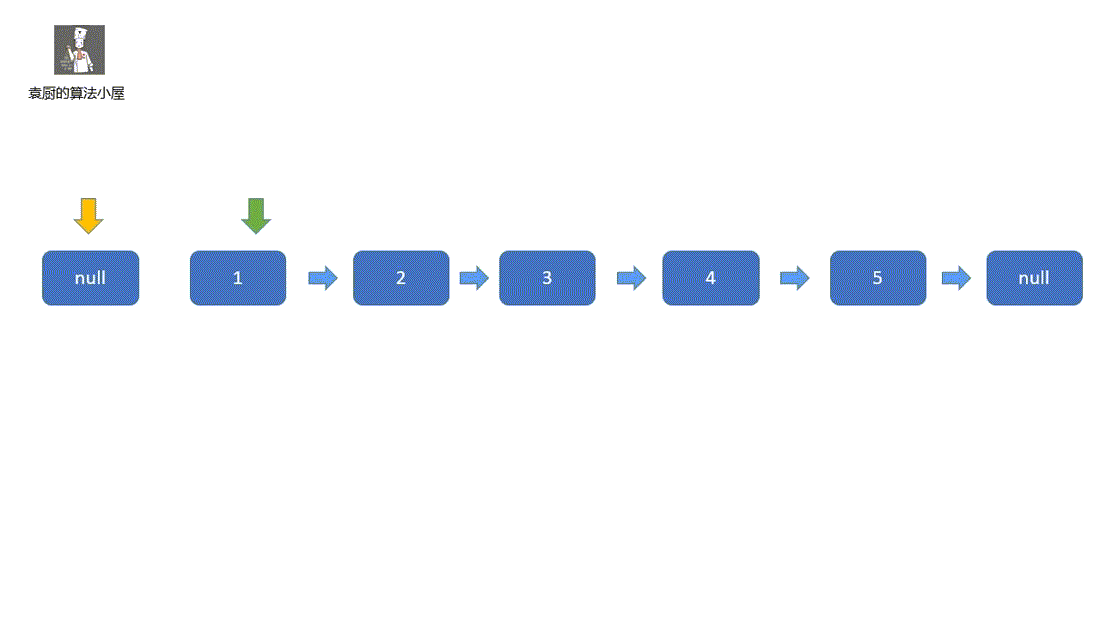> 如果阅读时,发现错误,或者动画不可以显示的问题可以添加我微信好友 **[tan45du_one](https://raw.githubusercontent.com/tan45du/tan45du.github.io/master/个人微信.15egrcgqd94w.jpg)** ,备注 github + 题目 + 问题 向我反馈
>
> 感谢支持,该仓库会一直维护,希望对各位有一丢丢帮助。
>
> 另外希望手机阅读的同学可以来我的 [**公众号:程序厨**](https://raw.githubusercontent.com/tan45du/test/master/微信图片_20210320152235.2pthdebvh1c0.png) 两个平台同步,想要和题友一起刷题,互相监督的同学,可以在我的小屋点击[**刷题小队**](https://raw.githubusercontent.com/tan45du/test/master/微信图片_20210320152235.2pthdebvh1c0.png)进入。
今天咱们说一道非常简单但是很经典的面试题,思路很容易,但是里面细节挺多,所以我们还是需要注意。
我们先来看一下题目描述。
#### [206. 反转链表](https://leetcode-cn.com/problems/reverse-linked-list/)
反转一个单链表。
**示例:**
> 输入: 1->2->3->4->5->NULL
> 输出: 5->4->3->2->1->NULL
该题目我们刚开始刷题的同学可能会想到先保存到数组中,然后从后往前遍历数组,重新组成链表,这样做是可以 AC 的,但是我们机试时往往不允许我们修改节点的值,仅仅是修改节点的指向。所以我们应该用什么方法来解决呢?
我们先来看动图,看看我们能不能理解。然后再对动图进行解析。

原理很容易理解,我们首先将 low 指针指向空节点, pro 节点指向 head 节点,
然后我们定义一个临时节点 temp 指向 pro 节点,
此时我们就记住了 pro 节点的位置,然后 pro = pro.next,这样我们三个指针指向三个不同的节点。
则我们将 temp 指针指向 low 节点,此时则完成了反转。
反转之后我们继续反转下一节点,则 low = temp 即可。然后重复执行上诉操作直至最后,这样则完成了反转链表。
我们下面看代码吧。
我会对每个关键点进行注释,大家可以参考动图理解。
**题目代码**
Java Code:
```java
class Solution {
public ListNode reverseList(ListNode head) {
//特殊情况
if (head == null || head.next == null) {
return head;
}
ListNode low = null;
ListNode pro = head;
while (pro != null) {
//代表橙色指针
ListNode temp = pro;
//移动绿色指针
pro = pro.next;
//反转节点
temp.next = low;
//移动黄色指针
low = temp;
}
return low;
}
}
```
C++ Code:
```cpp
class Solution {
public:
ListNode* reverseList(ListNode* head) {
//特殊情况
if (head == nullptr || head->next == nullptr) {
return head;
}
ListNode * low = nullptr;
ListNode * pro = head;
while (pro != nullptr) {
//代表橙色指针
ListNode * temp = pro;
//移动绿色指针
pro = pro->next;
//反转节点
temp->next = low;
//移动黄色指针
low = temp;
}
return low;
}
};
```
JS Code:
```javascript
var reverseList = function (head) {
//特殊情况
if (!head || !head.next) {
return head;
}
let low = null;
let pro = head;
while (pro) {
//代表橙色指针
let temp = pro;
//移动绿色指针
pro = pro.next;
//反转节点
temp.next = low;
//移动黄色指针
low = temp;
}
return low;
};
```
Python Code:
```python
class Solution:
def reverseList(self, head: ListNode) -> ListNode:
# 特殊情况
if head is None or head.next is None:
return head
low = None
pro = head
while pro is not None:
# 代表橙色指针
temp = pro
# 移动绿色指针
pro = pro.next
# 反转节点
temp.next = low
# 移动黄色指针
low = temp
return low
```
Swift Code:
```swift
class Solution {
func reverseList(_ head: ListNode?) -> ListNode? {
// 边界条件
if head == nil || head?.next == nil {
return head
}
var pro = head
var low: ListNode?
while pro != nil {
// 代表橙色指针
var temp = pro
// 移动绿色指针
pro = pro?.next
// 反转节点
temp?.next = low
// 移动黄色指针
low = temp
}
return low
}
}
```
Go Code:
```go
func reverseList(head *ListNode) *ListNode {
if head == nil || head.Next == nil { return head }
cur := head
var pre *ListNode
for cur != nil {
nxt := cur.Next
cur.Next = pre
pre = cur
cur = nxt
if nxt == nil {
return pre
}
nxt = nxt.Next
}
return pre
}
```
上面的迭代写法是不是搞懂啦,现在还有一种递归写法,不是特别容易理解,刚开始刷题的同学,可以只看迭代解法。
**题目代码**
Java Code:
```java
class Solution {
public ListNode reverseList(ListNode head) {
//结束条件
if (head == null || head.next == null) {
return head;
}
//保存最后一个节点
ListNode pro = reverseList(head.next);
//将节点进行反转。我们可以这样理解 4.next.next = 4
//4.next = 5
//则 5.next = 4 则实现了反转
head.next.next = head;
//防止循环
head.next = null;
return pro;
}
}
```
C++ Code:
```cpp
class Solution {
public:
ListNode * reverseList(ListNode * head) {
//结束条件
if (head == nullptr || head->next == nullptr) {
return head;
}
//保存最后一个节点
ListNode * pro = reverseList(head->next);
//将节点进行反转。我们可以这样理解 4->next->next = 4
//4->next = 5
//则 5->next = 4 则实现了反转
head->next->next = head;
//防止循环
head->next = nullptr;
return pro;
}
};
```
JS Code:
```javascript
var reverseList = function (head) {
//结束条件
if (!head || !head.next) {
return head;
}
//保存最后一个节点
let pro = reverseList(head.next);
//将节点进行反转。我们可以这样理解 4.next.next = 4
//4.next = 5
//则 5.next = 4 则实现了反转
head.next.next = head;
//防止循环
head.next = null;
return pro;
};
```
Python Code:
```python
class Solution:
def reverseList(self, head: ListNode) -> ListNode:
# 结束条件
if head is None or head.next is None:
return head
# 保存最后一个节点
pro = self.reverseList(head.next)
# 将节点进行反转。我们可以这样理解 4->next->next = 4
# 4->next = 5
# 则 5->next = 4 则实现了反转
head.next.next = head
# 防止循环
head.next = None
return pro
```
Swift Code:
```swift
class Solution {
func reverseList(_ head: ListNode?) -> ListNode? {
// 结束条件
if head == nil || head?.next == nil {
return head
}
var pro = reverseList(head?.next)
// 将节点进行反转
head?.next?.next = head
// 防止循环
head?.next = nil
return pro
}
}
```
> 贡献者[@jaredliw](https://github.com/jaredliw)注:
>
> 这里提供一个比较直观的递归写法供大家参考。由于代码比较直白,其它语言的我就不写啦。
>
> ```python
> class Solution:
> def reverseList(self, head: ListNode, prev_nd: ListNode = None) -> ListNode:
> # 结束条件
> if head is None:
> return prev_nd
> # 记录下一个节点并反转
> next_nd = head.next
> head.next = prev_nd
> # 给定下一组该反转的节点
> return self.reverseList(next_nd, head)
> ```